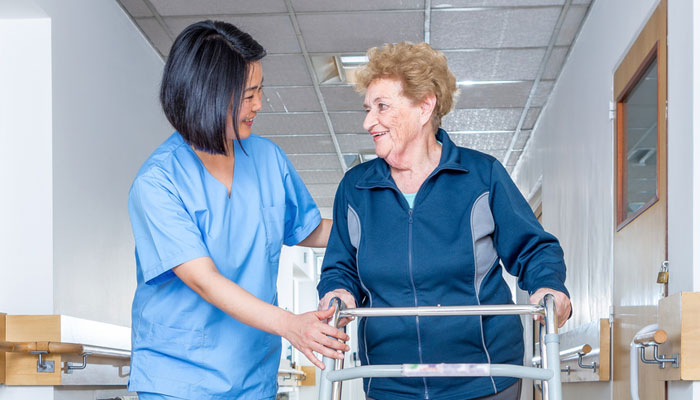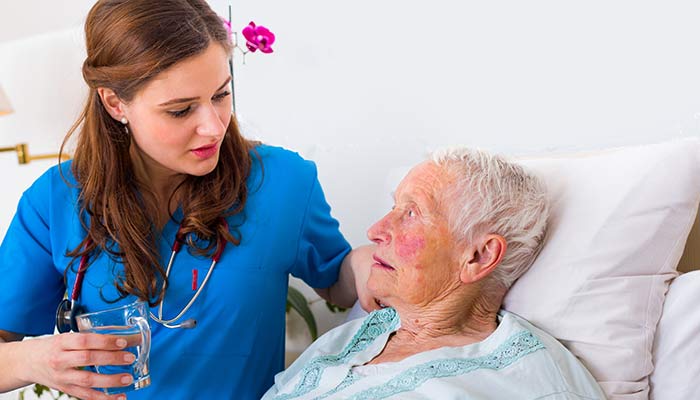Learn more at AgingWellMetroDC.com
Hospitalizations: During your stay
Hospitals achieve amazing results every day. That said, the staff can sometimes get so focused on the disease or on avoiding specific risks from a procedure that simple tasks for healing, such as walking and sleeping, can get lost. Choosing Wisely, a white paper by the American Academy of Nursing, has listed several common hospital practices that unintentionally get in the way of a solid recovery. Learn what you can do as a family member to help your loved one gain strength and recover quickly.
Walking your way out of the hospital
 “The bed is not your friend.” This is the overall message concerning the benefits of walking when hospitalized. In one study, patients who walked frequently were able to go home an average of 36 hours earlier than those who did not walk very much.
“The bed is not your friend.” This is the overall message concerning the benefits of walking when hospitalized. In one study, patients who walked frequently were able to go home an average of 36 hours earlier than those who did not walk very much.
After staying in bed for just two days, an older adult begins to lose muscle mass. In addition to losing strength, staying in bed puts older adults at greater risk for blood clots, bedsores, and confusion. They also become less able to take care of themselves. Some are then forced to live in a nursing home. Others may simply end up back in the hospital sooner.
Walking at least four times a day is a good goal. Attempt a slightly longer, more vigorous walk each time.
Here are things you can do to promote walking:
- Ask the nurse for approval to help your loved one walk. This way your relative doesn’t have to wait for a nurse to be free.
- Bring eyeglasses and hearing aids. Better vision and hearing will reduce the chance of a fall—a big concern for hospital staff.
- Ask if your relative can wear clothes and shoes from home. Wearing regular clothes during the day sets the mental stage for being more active—and healthy.
- Ask for physical therapy if your loved one seems weak or unsteady. This extra layer of support can help get him or her back up and at ’em.
Of course there may be good reasons to stay in bed. The first few hours after surgery, for instance. But once your loved one has been cleared for assisted walking, do what you can to help him or her take a spin around the hallway every three hours or so.
Return to top
Keeping a clear mind

It used to be considered normal and harmless for a hospital patient to be disoriented following surgery or while recovering from illness.
Studies now show that delirium actually has serious consequences. In particular, it can make memory loss and dementia worse. It can last long after the hospitalization. And it seems to even increase the person’s chance of dying during the next year. Patients in intensive care are the most at risk.
Symptoms of delirium
- Confused thinking
- Reduced awareness of the environment
- Strong emotions
What you can do
Strive to make sure your relative
- has a familiar person present. A friend or family member can be very reassuring
- has glasses and hearing aids. The ability to engage with the surroundings supports brain function. Bring books or other favorite pastimes to encourage focused activity
- drinks plenty of fluid. Dehydration can cause delirium
- is allowed to sleep with minimal interruptions
- is on minimal medication. Advocate for nondrug treatment of anxiety and sleep problems. Drugs that slow the brain contribute to delirium
- walks as soon and as often as possible
If you notice signs of delirium
Let the hospital staff know right away. They do not know your family member the way you do, so they may not recognize that things are amiss.
Advocating for a good night's sleep
Sleep has been underrated in our society, including in hospitals.
Despite their best intentions, hospital staff or policy may undermine the healing power of nighttime rest. For instance, a poor night’s sleep can contribute to dizziness and falls. And when we are sleep deprived we can’t fight infection as well, nor deal with pain effectively.
Promote uninterrupted sleep
Sleep is one of the body’s most healing activities. It has a cyclic pattern that should be respected. When your relative is hospitalized, do what you can to advocate for
- medicines being given during waking hours (work with the nurses to arrive at a schedule that does not interrupt sleep)
- lights out, monitors silent, and doors to your relative’s room closed at night
- no middle-of-the-night blood draws. Ask that draws occur when your loved one is awake in the morning
- vitals checked just before bed and then in the morning. Ask if blood pressure, pulse, temperature, pain, and respirations have been fairly steady. If so, ask if there is really a need to interrupt sleep at 1:00 am and 4:00 am
- effective and long-lasting pain management applied in the evening. This way, pain will not cause your loved one to wake up in the night
Of course there are reasons a patient may need midnight attention, especially in the Intensive Care Unit (ICU). Maybe the medical situation is still unstable—the illness not yet under control. Perhaps a test is needed to help develop a plan of care. Or to make immediate treatment decisions.
But if things are generally stable, it’s perfectly appropriate to ask, “What are the real risks of no interruptions between 10:00 pm and 6:00 am? Can it wait?” Healing may be a higher priority.
Contact us at 301-593-5285
